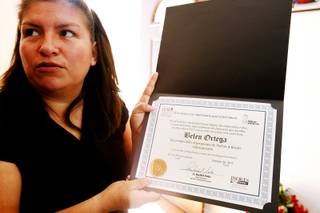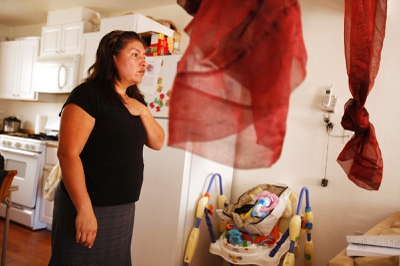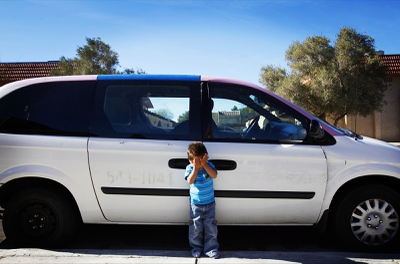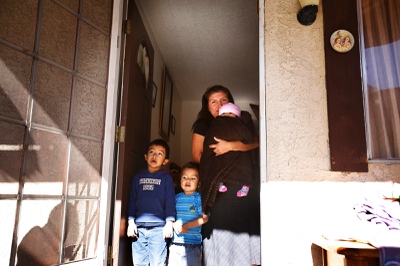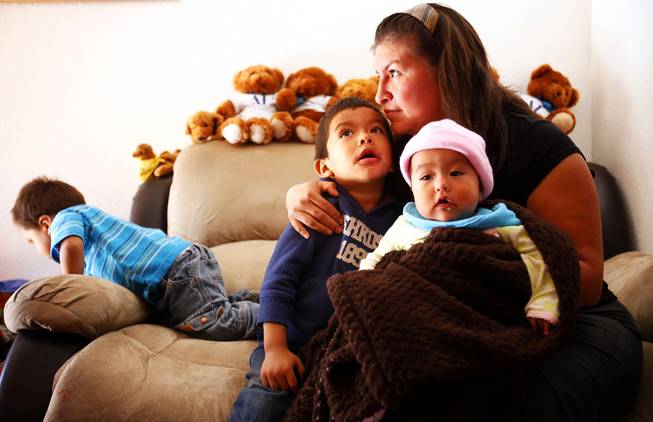
Belem Ortega is shown at home with her children Roberto, 4, Aldo, 2, and Maria Belem, 7 months, in Las Vegas on Jan. 24, 2012.
Tuesday, Feb. 7, 2012 | 2 a.m.
Related stories
- Nevada domestic violence by the numbers (2-7-2012)
- Nevada sharpens focus on domestic violence (11-3-2011)
It was Dec. 4, 2010, and Belem Ortega was lying face down on the bedroom floor, blood seeping from the gash on the crown of her head, recalculating the equation she had run in her mind a thousand times before.
The variables had remained relatively constant: Her desire to provide food, shelter and supervision for her three children weighed against her ability to withstand the physical violence from her boyfriend and her prospects for finding help as someone not legally in the country.
A little more than a week prior, right before Thanksgiving, a new variable emerged. Ortega was pregnant.
At that point she was broken. Her boyfriend and father of the two youngest children, Jesus Tepoxtecatl, had beaten and berated Ortega constantly for years.
She told Tepoxtecatl she didn’t want to have another baby with him. Ortega did not know what she would do. She could not bear the thought of another mouth to feed knowing Tepoxtecatl would most likely do what he had always done: sit at home drinking with his relatives and friends while she worked multiple jobs to bring home enough money to pay for the essentials.
Tepoxtecatl, on the other hand, was upbeat. Things would be better, different.
“He told me he would start helping,” Ortega, a diminutive 5-foot 2-inch woman with round cheeks, said. “I was foolish. All he cared about was himself. He wanted to be in the house because it was comfortable. I did all the work.”
Ortega’s mental calculations continued.
Would she be deported if she called the police? Who would help her, a Mexican immigrant who can’t speak English? Who would look after her children? In the past when she called the cops, her boyfriend would simply disappear before they arrived.
Ortega is not alone among women in Nevada, Hispanic women or immigrant women.
A recent federal Centers for Disease Control report found that nearly half of all women living in Nevada at the time of the survey had experienced domestic violence in their lifetime, a rate second only to Oklahoma’s.
“Domestic violence lives in shadows, lives in fear and it lives in isolation,” said Lisa Lynn Chapman, grant manager at Safe Nest, an area agency that provides services to victims of domestic violence. “Immigrant populations have all three of those innately built in, especially if they are undocumented. They are isolated because the person they turn to may not know their language. They don’t know the resources available to them if their English is not good. They are innately isolated, especially when they first come over.”
This time was different from the dozens of previous beatings. Ortega was pregnant, sick and weak from malnutrition. Tepoxtecatl wounded Ortega worse than ever before, smashing a clock radio across the back of her head repeatedly. When her 9-year-old daughter from a previous relationship stood up to defend her mother, according to the police report, Tepoxtecatl hit her, too.
Ortega embodies common issues faced by Hispanics, and more specifically immigrants, who are victims of domestic violence. Their isolation from mainstream services makes seeking help difficult, and research shows immigrants and Hispanics are less likely to reach out to formal services than other groups. Ortega and many of those in similar situations are often ignorant of the programs that can help them, including special visas for those who have been the victim of a crime.
“I didn’t think I had anywhere to go,” Ortega said in Spanish. “I didn’t know about the services. The hospital had never asked about my injuries before, and no place wants to help an ‘illegal.’ I asked myself: ‘What am I going to do now?’ ”
A pool of blood formed on the floor of Ortega’s bedroom. Tepoxtecatl tore the phone out of the wall, threw the clock radio in the trash, and left Ortega lying there. It was 3 a.m. and Ortega stumbled outside into the chilly North Las Vegas air, disoriented and unsure of where to turn.
Perfect environment for abuse
Like a petri dish for bacteria, Ortega’s circumstances made for the perfect environment for domestic violence to develop unabated.
Lawyers, law enforcement, researchers and advocates all agree on certain patterns seen with domestic violence. The abuser will attempt to control the victim, often through threats, isolation from others and by reigning over family finances.
It typically takes several attempts for a victim to leave an abuser, and physical violence is frequently not reported until after it has escalated over time.
All of these factors are amplified in varying degrees for Hispanics and immigrants, those who offer services to domestic abuse victims agree.
“If the abuser is here legally and the victim is undocumented, the abuser will use the fear that they will be deported against them,” said Marlene Richter, executive director of Shade Tree, another agency that offers crisis services to abused women and children in the valley. “They may threaten to call immigration services on the victim or their children. These are all ways they can intimidate the victim and gain compliance. If the victim is here legally, there still can be language and cultural barriers to them seeking help.”
Fear of losing child custody could also play a part. In 2005 the Nevada Supreme Court ruled that immigration status can be used against a parent in a custody battle.
For Ortega, the abuse started when she was 22. The father of her first child, who was born in 2001 in Morelia, Mexico, beat Ortega in fits of drunken jealousy, she said.
She went to the police, but they did nothing.
“He was worthless,” Ortega said, “a drunk, rude womanizer. But he had family in the police department, and they ignored me.”
Many victims’ advocates say a distrust of law enforcement in an immigrant’s home country often prevents them from contacting authorities in the United States. The same holds true for nongovernmental organizations in their home countries, the advocates say.
“When we start talking about the immigrant population, many of them came from countries where the authorities can’t be trusted,” Chapman said. “In fact, in many cases the NGOs in those countries may be working with, and reporting back to, the government. Trust is in short supply.”
When Ortega arrived in Las Vegas in 2004, she was entirely alone. It was a new beginning, and she figured she would find work in the booming economy. She would send money home to her mother, who was suffering from diabetes and caring for her daughter. Yet, Ortega had no family or friends in Las Vegas, did not speak English and was illegally in the country.
She met Tepoxtecatl at a general store where they both worked, and they started dating.
By the end of 2006 she was pregnant and living with him. A pattern started to emerge, Ortega said. She worked, Tepoxtecatl sometimes worked and mostly drank with his buddies. They would fight and he would disappear. He would come back, and, lacking help from any corner, Ortega would open the door.
In late 2009, after the couple’s second child was born and Ortega’s first child had come to join her in Las Vegas, the mother of three came home one evening to find Tepoxtecatl drunk and full on the children’s food. Ortega confronted Tepoxtecatl. According to Ortega, Tepoxtecatl threw her on the couch and started beating her. The couch broke, and she bit his hand to escape.
When the police came, Tepoxtecatl showed his bite wound, and the officers did not arrest him, Ortega said. They asked if she wanted to file charges, but she declined.
“I had no family, no one,” she said. “I was scared. I didn’t have papers, and I thought it would be a bad idea to press charges.”
At that point the entire family was living off the $1,600 a month Ortega brought home as the supervisor at a cleaning company. When men called her home trying to organize an appointment, Tepoxtecatl would grow jealous and violent. His behavior, coupled with Ortega’s added burden to carry all of the financial weight, she said, prevented her from learning English and making friends, much less assimilating into the community.
In the United States there are special visa programs for female victims of a crime and victims of a crime of any sex, but Ortega was completely oblivious of such options.
While the federal Secure Communities program checks the immigration status of those locked up by local law enforcement, it does not pertain to victims, witnesses or those who report a crime.
Still, those who work with domestic violence victims say programs such as Secure Communities have had a chilling effect on the immigrant community, making them reluctant to contact police.
Metro Police take more than 23,000 domestic violence reports each year, and several programs have been set up to encourage community members to report domestic violence and to help officers better handle the sensitive cases. Lt. Rob Lundquist, head of Metro’s domestic violence detail, says the police’s priority is keeping victims safe and they would never inquire to a victim or witness’ immigration status. Metro Police have collaborated with the Southern Nevada Housing Authority on a domestic violence prevention program that included announcements in Spanish. Nevertheless, Lundquist says barriers remain between the police and immigrant community.
“When people come forward about a crime being committed, we are not concerned with their immigration status,” he said. “We want to make people feel as safe as possible, and some great strides have been made in that area. We have dealt with people in the faith-based organizations, especially the Hispanic faith-based community.”
Ortega is also deeply religious, attending regular services and frequently crediting God for helping her.
Yet, she was also given conflicting advice from faith leaders on what to do about the abuse she was suffering. A leader at a Christian church she attended told her the abuse was her “cross to bear.”
“A lot of Hispanics especially are Catholic, and that contributes to their drive to stay in a relationship no matter what,” said Samantha Jayme, director of outreach and education at S.A.F.E. House, another crisis-intervention agency. “They are taught that they are married before God, and the church recognizes marriage as forever. They feel like they are sinning if they leave their husband, but that is something we have worked on with faith-based leaders ... to get rid of that stigma.”
After living with the violence for four years and seeing potential trails toward assistance run cold, Ortega did not believe help was out there for her.
“It’s very scary to get out of a domestic violence situation and go around asking for anything,” Richter said. “As soon as it looks like there isn’t help, they will quit. They don’t have the energy and are so filled with fear. They won’t go driving or taking the bus around trying to find help.”
Help hides in plain sight
After walking out of her home that December night in 2010, Ortega pleaded for answers and fought off tears. Feeling nauseous before the brutal attack from Tepoxtecatl, Ortega was now in need of medical attention. The blood was starting to clot and was matting down her short black hair.
The equation ran once more in her head as she stood under a street lamp.
“My three children had already seen too much, had been through too much,” the 32-year-old said. “After he hit my daughter, that was it. I wouldn’t let my baby girl on the way go through what my oldest went through.”
Finally she went to a neighbor’s house, and they called the police. She was taken to Valley Hospital Medical Center for treatment. Tepoxtecatl denied he hit Ortega with the clock radio, but officers found the bloodied bedside item in the trash. The children were taken by Child Protective Services for the night. Tepoxtecatl was arrested on two charges, misdemeanor battery — domestic violence and felony battery with a deadly weapon, according to police records. He was sentenced to two weeks in jail and one year probation. Ortega has not seen Tepoxtecatl since the trial.
That was just the beginning of Ortega’s recovery. She was unemployed, pregnant and frail. She still had not been introduced to the services that would put her on stable ground again.
“No one asked me anything, and no one told me anything,” Ortega said. “I went to organizations that supposedly help families, and they turned me away because I’m here illegally. Because I didn’t have a Social Security number, they didn’t want to help me or my children.”
Perla Padilla, a Mexican immigrant living in Las Vegas, was beaten unconscious by her now ex-husband and father of her son. Padilla’s husband bit off a portion of her lip, and she would later wake up in the hospital with injuries that would require two surgeries to repair. She referred to her introduction to domestic violence services as the “chain.”
“It was like I was blind,” the 23-year-old said in Spanish. “I was in my own world, and I simply didn’t know that help was out there. But after I was in the hospital I was referred to one place, then it went from there. One recommendation led to another.”
Unlike Ortega, Perla had her family here to help. She already has her visa, and is working as a maid at the Mirage. The structure of her life has been rebuilt, while her psyche is a work in progress.
“What people don’t realize is a little delay is a big deal,” Padilla said. “I still need therapy. Recovery is a long process.”
While all three of the major Las Vegas providers of domestic violence services, Shade Tree, Safe Nest, and S.A.F.E. House, keep Spanish-speaking staff on hand and accept all clients regardless of immigration status, none of their websites is translated into Spanish.
Administrators from all three lamented that tight budgets have prevented them from commissioning the translations and from adding more Spanish speakers to assist their overworked bilingual staff.
“I thought a shelter was for homeless people,” Ortega said. “I had a home. I had no idea that there were places that would take me in, much less my children too. I was completely unaware of the services and options available.”
Then, one day while at her daughter’s elementary school, Ortega met the first link in what would become her “chain.” She had left her first Las Vegas church, which failed to support her, and Ortega’s new friend introduced her to a different congregation and advocated on her behalf. The church solicited donations for the family.
It was not until Ortega saw a report on Spanish-language television about Safe Faith United and its founder, Rebeca Ferreira, that she finally made contact with an organization specializing in domestic violence.
Indeed, Ferreira started Safe Faith United because she saw a deficiency in the services provided to all women of color.
“We need to realize something is terribly wrong,” Ferreira said. “The rates of abuse are far too high in Nevada. We need to make changes, and I think that begins with strengthening laws and providing a variety of programs. Not every victim is the same and can be approached in the same way.”
Ferreira has also worked with Padilla, whose ex-husband was a U.S. citizen, making her eligible to self-petition for residency under the Violence Against Women Act. The act applies in the majority of cases to those who have been abused by U.S. citizens. Ortega, on the other hand, with no ties to the United States was only eligible for a visa, which was crafted to aid in the prosecution of violent crimes by providing a legal status to those who cooperate with authorities.
After six months on her own, Ortega was steered toward Hermandad Mexicana, a nonprofit organization that specializes in immigration issues, and she applied for her visa.
These days Ortega cares for her children — the baby was born without any health issues despite the abuse and poor nutrition — and waits for word on her visa application. The estimated processing time is eight to nine months.
She takes her small children with her as she collects cans to recycle for extra money. She has always worked and would like to work again but is prohibited from doing so while her visa application is vetted. So, instead she receives food stamps and money through the federal Temporary Assistance for Needy Families program, which she was eligible for after starting her path toward legal residency.
If she had known sooner that a visa was an option, she might already be working.
“It was months after (Tepoxtecatl) was arrested before I received any help at all,” Ortega said. “I know the services are there now, but it is very hard for someone in my position to find them. I didn’t have a car, or even money to take my kids to school on the bus. I worry for those who don’t make it, who don’t leave. Others will not survive. They will end up with their skulls split open like me. Something must be done, because right now we are invisible.”
